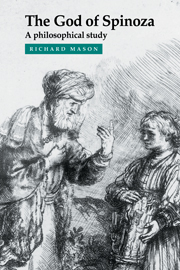PART I - THE GOD OF THE PHILOSOPHERS
Published online by Cambridge University Press: 06 January 2010
Summary
Natural Philosophy teaches us the Causes and Effects of all Bodies simply and in them selvs. But if you extend it a little further, to that indeed which its Name imports, signifying the Lov of Nature, it leads us into a Diligent inquisition into all Natures, their Qualities, Affections, Relations, Causes and Ends, so far forth as by Nature and Reason they may be Known. And this Noble Science, as such is most Sublime and Perfect, it includes all Humanity and Divinity together GOD, Angels, Men, Affections, Habits, Actions, Virtues; Evry Thing as it is a Solid intire Object singly proposed, being a subject of it, as well as Material and visible Things But taking it as is usualy Bounded in its Terms, it treateth only of Corporeal Things, as Heaven, Earth Air Water, Fire, the Sun and Stars, Trees Herbs, flowers, Influences, Winds, Fowles Beasts Fishes Minerals, and Precious Stones; with all other Beings of that Kind. And as thus it is taken it is Nobly Subservient to the Highest Ends: for it Openeth the Riches of Gods Kingdom and the Natures of His Territories Works and Creatures in a Wonderfull Maner, Clearing and preparing the Ey of the Enjoyer.
Thomas Traherne: Centuries, III, 44 (c. 1670)- Type
- Chapter
- Information
- The God of SpinozaA Philosophical Study, pp. 19 - 20Publisher: Cambridge University PressPrint publication year: 1997



